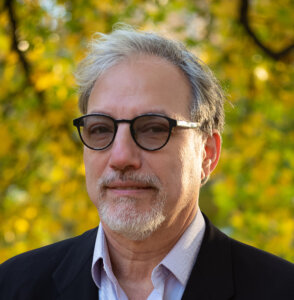Trump’s election proves it: The idea of an ‘American Jewish community’ is a myth
Jews have long been seen as a cohesive voting community. Not anymore

Baseball hats are embroidered with the phrase “Don’t kvetch. Vote.” at a Jewish Get Out The Vote center in Pennsylvania. Photo by Rachel Wisniewski/For the Washington Post/Getty Images
In the coming weeks and months, Jews will doubtless be reading a great deal about what role “the American Jewish community” played in the 2024 presidential election, and what its future may be. But those are bad questions.
One of the many disconcerting truths revealed by President-elect Donald Trump’s smashing electoral victory is there is no such “community.” There can be no single, cohesive political “community” in which an embrace of traditional American Jewish liberalism coexists with support for Trump’s fascist, racist, misogynist movement. The idea that American Jews, in all their diversity, form one bloc has rarely seemed as fallacious as it does today.
Many Jews understandably wish it were otherwise. A number of people have jumped on a preliminary exit poll that put Jewish support for Vice President Kamala Harris’ ticket at 79%. People crowing about these numbers did not notice the fine print, which admitted that the poll was so preliminary that it covered only 10 states, and did not include the roughly 40% of American Jewish voters who live in either New York or California, making it pretty much meaningless.
It’s also not difficult to find contrary polling data. An AP/Fox News poll found that 66% of Jews supported Harris. An exit poll of Jews in Pennsylvania — where the Jewish vote particularly mattered, and where Harris, her running mate, Gov. Tim Walz, and the state’s Jewish governor, Josh Shapiro, tirelessly campaigned for the ticket — suggested that Harris did not manage to win even half the Jewish vote. According to one analysis, “Counties and jurisdictions with sizable Jewish populations swung notably towards Republicans, compared to 2020.” A reliable pre-election poll published in the Forward put Jewish support for the Democratic ticket at just 62%, its lowest level since 1988.
What this shows us: The idea of a clearly defined American Jewish community characterized by a broadly accepted set of shared values is one of which we must now be skeptical. Which means that whenever that idea is invoked, the question is: Who does it really serve, and what are they trying to get out of it?
The belief in an actual American Jewish community is especially convenient for two sets of people.
First are those Jews who make their living pretending to speak for the Jews at large. The machers who run AIPAC, the ADL, the AJC and virtually all of the member groups of the Conference of Presidents of Major Jewish Organizations are forever issuing statements about what Jews allegedly think and feel. Their relevance depends on the perception that the people for whom they profess to speak are being fairly represented by their statements and agree with their political campaigns.
Both assumptions are false.
In 2013, when a detailed Pew study of the attitudes of American Jews found that virtually all of these organizations took political positions well to the right of those held by most American Jews, the then-longtime chief executive officer of the ADL, Abe Foxman, explained why this was the case. “Listen,” he said, “there’s a lot of organized Jewish life, and these are the people that pay the bills.”
Those billpayers, like megadonors Miriam Adelson and the late Bernie Marcus, tend to be Jewish billionaires and multimillionaires who apparently care a great deal more about Trump’s promised tax cuts for the wealthy, his support for Israeli Prime Minister Benjamin Netanyahu’s right-wing extremist government, and his promise to crack down on colleges that allow pro-Palestinian demonstrations on campus than they do about the fact that Trump has surrounded himself with unapologetic antisemites. Or about, say, the fact that Trump has frequently repeated the belief that American Jews owe loyalty to Israel as well as, or even above, the United States. Or that he has frequently expressed personal admiration for Hitler, and even made threats against American Jews who planned to vote against him.
The sympathy that so many ultra-rich funders have for Trump explains the otherwise shocking silence of Jewish organizations in the wake of Trump’s Nazi-style pre-election hatefest at Madison Square Garden. “There’s no question about it: For the American Jewish Committee, the ADL, Conference of Presidents, the federations, all these institutes,” Foxman said, “if this happened six months ago, they would be out there condemning racism and antisemitism and hate speech.”
But today they were hedging their bets, concerned not only that Trump might actually win — as he did — but also that their right-leaning donors might not cotton to overly harsh criticism of the candidate to whom they had pledged their financial support, and whom they hope will represent their interests once in power.
The ill effects of mistaking these groups and their funders as being genuinely representative of American Jews have been obvious throughout this election cycle. These organizations and their funders are frequent sources for mainstream media, especially for reactions to the tumult around the Israel-Hamas war. Add in the overrepresentation of neoconservatives within the punditocracy, and it’s easy to see why so much of the discussion of American Jews’ political views has treated Israel as one of our top political concerns — when, in fact, less parochial issues have tended to drive our voting with far greater consistency for decades now.
Even before this election, it had long been clear that the definition of “Jews” in the U.S. was changing in ways that eroded the sense of a coherent political community — outside of the Orthodox community, which is politically conservative and extremely hawkish on Israel, and tends to vote as a bloc. Along with the vast majority of Israeli Jews, the Orthodox have consistently preferred Trump to all three of his Democratic opponents.
But the Orthodox make up only about 10% of the American Jewish population. The rest is composed of Conservative, Reform and Reconstructionist Jews — along with members of the increasingly popular category of “just Jews” — a growing number of whom belong to no congregation and do not attend religious services, but nevertheless identify as Jews. It may have made sense to speak of that majority, collectively, as a single political voice in the days when “Jewish” meant “liberal” and “Zionist” simultaneously — as it did for so many decades in the wake of Israel’s founding in 1948, and especially after the 1967 War.
Those days, however, are over.
In the wake of Israel’s brutal invasion of Gaza following the devastating Oct. 7 terrorist attack, American Jews have been divided as never before. We cannot agree, it seems, on anything: Is Israel guilty of genocide? Of apartheid? Of “settler colonialism”? Are anti-Zionist protests inherently antisemitic, or can they be a valid expression of Jewish values? Are the goals advanced by Christian nationalism incompatible with American religious freedom?
These conflicts will only grow under a second Trump presidency, as those groups most interested in the myth of an American Jewish community stretch to encompass — and above all, not alienate — the Jews who have aligned themselves with the MAGA movement. In the future, Jewish historians will say of American Jews in 2024, as the Torah scribes did in Judges 17:6: “In those days, there was no king in Israel; everyone did what was right in his own eyes.”

















